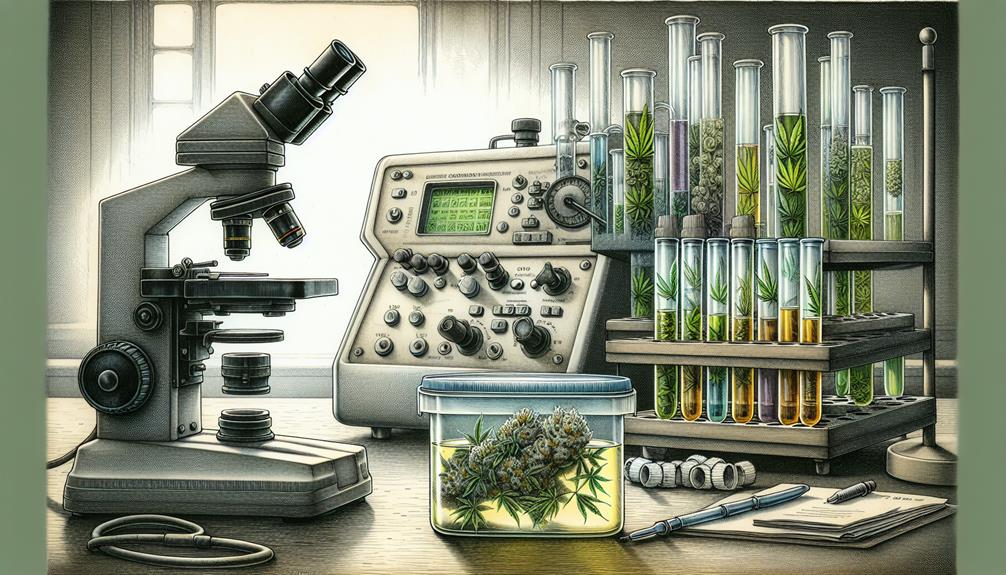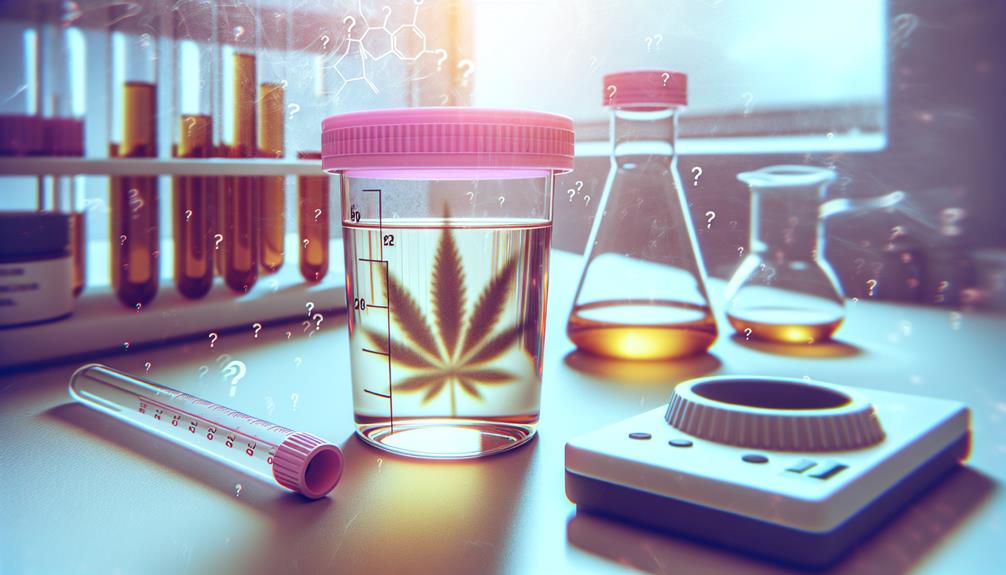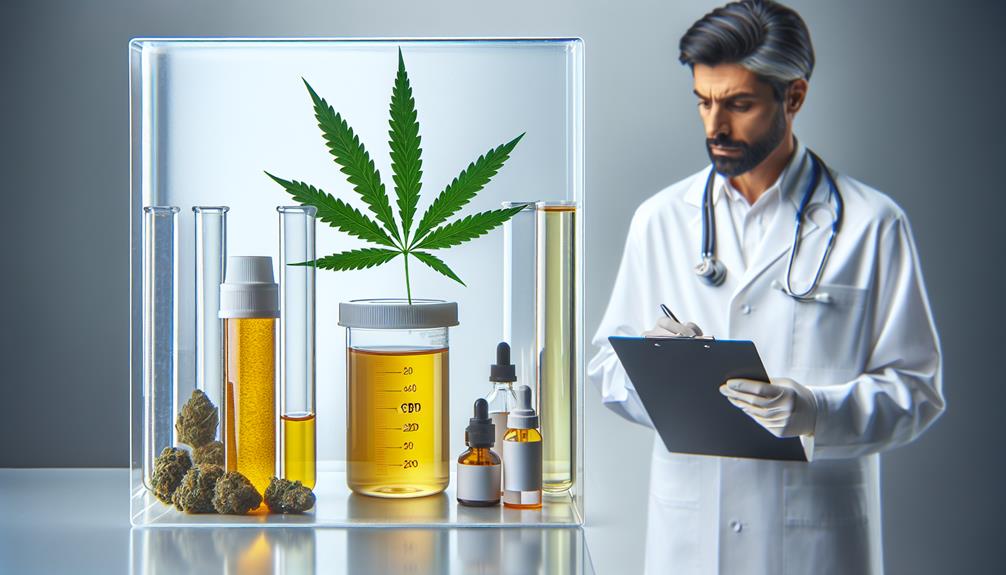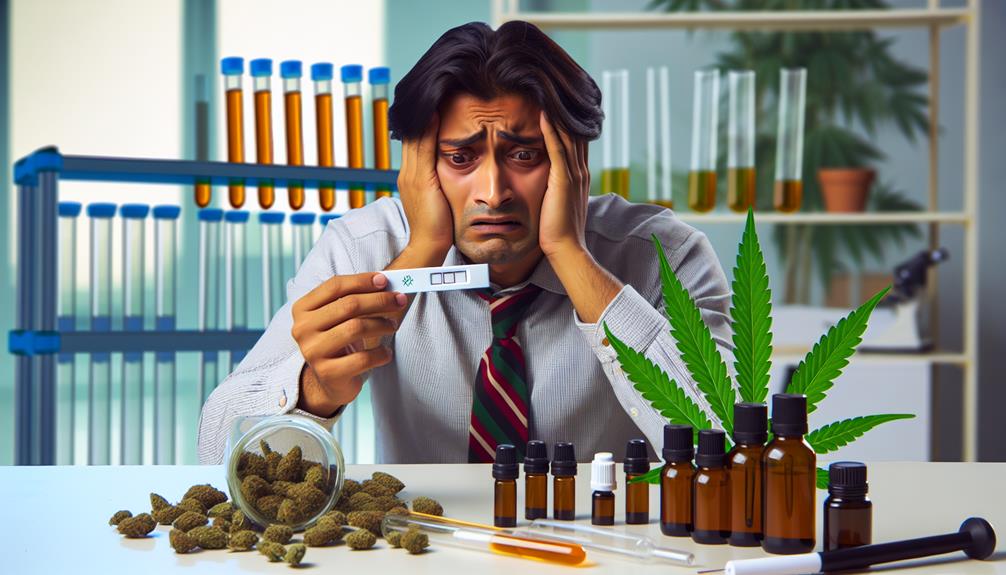While you might believe that using CBD products could never jeopardize your job during a drug screening, the truth is a bit more complicated. As you navigate the increasingly popular world of CBD, it's essential to understand how even trace amounts of THC in your products might affect drug test results. You'll find the market flooded with options labeled as 'THC-free,' but without proper regulation, these claims can be misleading, potentially leading to unexpected and serious consequences. Suppose you're relying on those labels to safeguard your career. In that case, you must arm yourself with knowledge about the types of CBD products available, the mechanics of drug testing, and the legal implications of a positive result. Let's explore how you can prevent complications and what steps to take if you're faced with a positive drug test result—information that might just make all the difference in maintaining your professional standing.
Understanding CBD and THC
To minimize the risk of a failed drug test, it's crucial to distinguish between CBD, a non-psychoactive compound in cannabis, and THC, the substance responsible for marijuana's intoxicating effects. CBD's burgeoning market includes a vast array of hemp-derived topical products available, with each item's cannabinoid content and label under scrutiny to ensure compliance with the legal threshold of THC content.
While CBD is renowned for its potential therapeutic applications, devoid of altering cognitive function, THC is the principal psychoactive constituent in cannabis, inducing euphoria and impaired motor skills. Urine drug tests for cannabis primarily target THC metabolites, not CBD. Therefore, a product with a CBD isolate or broad-spectrum designation should, theoretically, eliminate the likelihood of a positive THC test.
However, trace amounts of THC might still be present in CBD products, albeit below the 0.3% legal limit. This minute concentration could accumulate over time, potentially triggering a positive result on a sensitive drug test. Hence, it's imperative that consumers meticulously review third-party lab results correlating with product labels to authenticate a product's THC content. The CBD industry's adherence to stringent testing and accurate labeling is pivotal in safeguarding against inadvertent positive drug tests.
CBD Product Types
Understanding the distinction between CBD and THC is essential, and equally important is recognizing the various types of CBD products available, each with their specific THC content. CBD products sold online and in stores range from CBD oil to edibles like gummies and capsules. They typically fall into categories such as full-spectrum, broad-spectrum, and CBD isolate. Full-spectrum products contain all compounds found in cannabis, including up to 0.3% THC, which could potentially lead to a positive drug test result. Broad-spectrum options, on the other hand, maintain a range of cannabinoids but are supposed to have THC removed, reducing the risk of accumulating THC metabolites in your system. CBD isolate products are labeled as 100% CBD and should not contain trace amounts of THC.
However, due to the mislabeling issue in the industry, even products labeled as THC-free might harbor THC, causing you to test positive unexpectedly. To mitigate this risk, look for products with a certificate of analysis from an accredited third-party lab, which tests for the Amount of THC. Labeling Accuracy of Cannabidiol Examinations can reveal if a product contains high levels of THC, ensuring you're informed about what you're consuming.
Drug Test Mechanics

You must understand the various types of drug tests available, as they differ in their sensitivity and specificity for THC, the psychoactive component in cannabis that most tests target. These tests have distinct detection windows, which define how long after use THC or its metabolites can trigger a positive result. When considering CBD products, it's essential to recognize that while tests do not typically screen for CBD, the presence of THC, even in trace amounts, can lead to a false positive.
Types of Drug Tests
Drug tests, designed to detect THC rather than CBD, primarily employ methods such as immunoassay and mass spectrometry to reveal the presence of illicit substances. Using CBD that may contain THC can be risky, especially in contexts like workplace drug testing. Different tests check for THC with varying degrees of sensitivity.
| Test Type | Substance Detected |
|---|---|
| Urine Test | THC, not CBD |
| Blood Test | THC metabolites |
| Hair Test | Long-term THC use |
A hair test, for instance, could yield a positive drug test result if THC products were used over a prolonged period. Drug Screening: A Valuable tool, these tests are precise in their aim to check for THC, not CBD. Broad-spectrum CBD and CBD isolate are less likely to contain THC and thus, less likely to result in a positive test.
Detection Windows Explained
When considering the use of CBD products, it's crucial to be aware of how long THC metabolites may linger in your system, potentially triggering a positive result on a drug test. Drug testing targets THC, not cannabidiol (CBD). However, due to the accumulation of THC metabolites from regular or high-dose use of CBD products, you could face a positive test for marijuana. The sensitivity of tests is often measured in nanograms per milliliter, and even minute levels can result in a positive reading. Be wary of secondhand exposure and mislabeled products, as these can lead to a false positive. Detection windows explained: THC can be detectable in urine from several days to a week after exposure, influencing test results. Always check for a certificate of analysis to ensure THC levels are within legal limits.
CBD Vs THC Testing
Understanding the detection windows for THC is essential, as the mechanics of drug tests are designed to identify THC metabolites, not CBD, which is why even low levels of THC contamination in CBD products can result in a positive drug test outcome. The difference between CBD and THC is crucial; standard tests do not target the former. However, mislabeling and contained THC in products may contain trace amounts that accumulate, posing risks for those who frequently use CBD products. To mitigate the chance of a positive result, scrutinize product labels for Drug Administration compliance, verify third-party lab certificates, and opt for purchases from licensed dispensaries with rigorous testing standards. It's imperative to understand that THC contamination, not the CBD drug itself, triggers test alerts.
Potential for Positive Results

You should be aware that using CBD products could inadvertently lead to positive drug test results due to the potential presence of THC contaminants. The cannabis sativa plant contains both CBD and THC compounds. While CBD is non-psychoactive, THC is the substance typically screened for in types of drug tests related to cannabis use.
Widespread mislabeling in the CBD industry means that products may contain small amounts of THC even if they are marketed as THC-free. When taking CBD, particularly in high doses or frequent use, these trace levels can accumulate in your body over time.
This accumulation can lead to a positive result on a drug test for THC, even if you've never used marijuana directly. It's crucial to understand that while CBD and THC are different compounds, the lack of regulation can cause cross-contamination.
Here's a table that outlines the potential for positive test results:
| Factor | Impact on Drug Test | Consideration |
|---|---|---|
| Widespread Mislabeling | May contain THC | Verify product testing |
| Small Amounts of THC | Accumulate in body | Risk increases with dosage |
| Taking CBD | May lead to a positive | Monitor frequency of use |
| Types of Drug Tests | Vary in sensitivity | Confirm type of test used |
| THC Metabolites | Stored in fat cells | Longer detection window |
To mitigate the risk, verify third-party lab testing of CBD products for precise THC content.
Legal Implications
Considering the potential for THC contamination in mislabeled CBD products, it's crucial to examine the legal implications that may arise from a positive drug test. The presence of THC, which is the psychoactive compound in the cannabis plant, can lead to a positive test that indicates marijuana use, despite your intention to use CBD only.
Here are key points to consider:
- Employment Consequences: A positive drug test for THC can result in disciplinary action or termination, even if it's due to CBD use that inadvertently contains THC.
- Legal Distinctions: While hemp-derived CBD is legal on a federal level if it contains less than 0.3% delta-9 THC, state laws vary, and some do not differentiate between marijuana and hemp.
- Product Mislabeling: Companies that misrepresent their products' CBD or THC content can be held liable for resulting legal issues, including the consequences of a positive drug test.
- Regulatory Compliance: Safety-sensitive industries may have stringent drug policies, and employees must be aware that using CBD products could jeopardize their compliance with these regulations.
Your understanding of these legal nuances is essential when deciding to incorporate CBD into your routine, particularly if you're subject to regular drug screenings.
Preventing Test Complications

To mitigate the risk of testing complications, you must understand how CBD metabolizes in your body and the factors influencing detectability. Selecting CBD products necessitates scrutiny of THC content, ensuring they fall below the legal THC thresholds and are verified by credible lab analyses. You're advised to opt for products with clear labeling and third-party certifications to circumvent the potential for unintended THC exposure.
Understanding CBD Metabolism
Most CBD users are unaware that the metabolism of CBD in their bodies can inadvertently lead to THC exposure, potentially complicating drug test results. When you consume a CBD product, your body metabolizes it, sometimes producing a THC-like breakdown product. This can occur even with CBD labeled as free from THC.
Here are key points to consider:
- Choose Wisely: Opt for Isolate products or CBD isolate to minimize THC exposure.
- Understand Labels: Full-spectrum CBD may contain trace amounts of THC, a compound found in the cannabis plant.
- Test Certainty: Seek products with a certificate of analysis (COA) for precise THC content.
- Metabolism Matters: Regular, high-dose consumption could increase the risk of a positive test due to the accumulation of THC or its metabolites.
Choosing CBD Products Wisely
Given the potential for CBD metabolism to produce THC-like compounds, it's critical that you select products with care to avoid testing complications. Opt for CBD products labeled as THC-free, broad-spectrum, CBD isolate, or 100% CBD. These designations are your first line of defense against inadvertent delta-9 THC exposure. To ensure Content and Label Accuracy, scrutinize the certificate of analysis (COA) provided by accredited third-party labs. This document verifies the amounts of cannabinoids present and is paramount in assessing Label Accuracy of Hemp-Derived products. Due to the lack of regulation, you must exercise due diligence. Contact the manufacturer if COA details are unclear, and make sure to purchase from licensed dispensaries that guarantee product integrity to prevent a positive test.
Legal THC Thresholds
While the legal THC threshold in hemp-derived CBD products stands at 0.3%, even trace amounts below this limit may still trigger a positive drug test. Here's what you need to consider:
- Content Analysis: Ensure the Accuracy of Cannabidiol Extracts by verifying third-party lab results for THC content.
- Delta-9 Tetrahydrocannabinol: Recognize that delta-9 tetrahydrocannabinol (THC) is the part of the cannabis plant responsible for the marijuana high and is the primary target in drug screenings.
- Avoid Failing: Opt for products labeled as broad-spectrum CBD or CBD isolate to minimalize the risk of THC exposure and a positive test.
- Regular Usage: Be aware that habitual consumption of CBD can accumulate trace levels of THC even from products that claim to have less than 0.3% THC, elevating the risk of a positive result.
After a Positive Test Result

Upon receiving a positive THC drug test result, it's imperative to investigate whether CBD product contamination could be the cause. Mislabeling issues and insufficient regulation may result in cannabidiol extracts sold online containing higher levels of THC than advertised. If you regularly take CBD, it's vital to consider the potential for a positive test result. Confirming the source involves a technical examination of the product, often using methods like mass spectrometry.
The table below summarizes key considerations:
| Factor | Description | Relevance to CBD Use |
|---|---|---|
| Screening | Urine tests detect THC metabolites. | Regular use increases detection risk. |
| Product Type | Broad-spectrum/isolate products should contain no THC. | Mislabeling can lead to contamination. |
| Lab Verification | Third-party testing for THC levels. | Provides proof of THC-free products. |
| Dose | High doses of CBD may lead to detectable levels of THC. | Monitor and limit intake accordingly. |
| Legal Consequences | Positive results can have serious implications. | Understand the risks before use. |
In any instance, it's crucial to approach the situation analytically. Assess the products you use, and if possible, reference the certificate of analysis. The "CBD Show" and "Screening: A Valuable Office Practice" emphasize the importance of thorough testing and understanding the technical details behind CBD and drug interactions.
Frequently Asked Questions
Do Employers Look for CBD in Drug Test?
Employers generally don't look for CBD in drug tests, but they do test for THC. Workplace policies vary, and understanding drug test types and substance thresholds is crucial. Full-spectrum products may contain THC, unlike isolates. Prescription CBD, metabolism variability, secondhand exposure, and cross-contamination risks could affect test outcomes. Ensure you're well-versed in CBD legality and your company's stance to navigate potential issues.
How Long Does CBD Stay in Urine?
You're curious about CBD's linger in your system. Well, CBD metabolism and urine detection depend on several factors, including cannabinoid clearance rate and detection window. Lab analysis shows half-life variability affects how long it stays detectable. Consumption frequency, CBD concentration, hydration effects, and metabolite retention all impact duration. Typically, CBD can be traced in urine for days, but this varies per individual and product use. Stay informed on these aspects to understand your body's processing timeline.
Can Just CBD Fail Drug Test?
You're wondering if pure CBD can fail a drug test. It's crucial to understand that while CBD legality permits hemp derivatives, the THC content in full-spectrum products might trigger false positives. Isolate differences, such as bioavailability factors and metabolism rates, influence substance thresholds in tests. To mitigate cross-contamination concerns, scrutinize product labels and lab reports. Your diligence is key in avoiding unintended THC exposure and test complications.
How Far Back Does a 10 Panel Urine Test Go?
You're facing a 10-panel urine test, which looks back typically 1-4 days. However, detection limits vary due to metabolite lifespan and your elimination rate. Urine analysis assesses sample validity with high testing accuracy. Substance identification hinges on legal thresholds, raising cross-reactivity concerns, especially for false positives. Remember, drugs like marijuana can linger in your system, detectable for up to 30 days, depending on usage patterns and individual metabolism.
